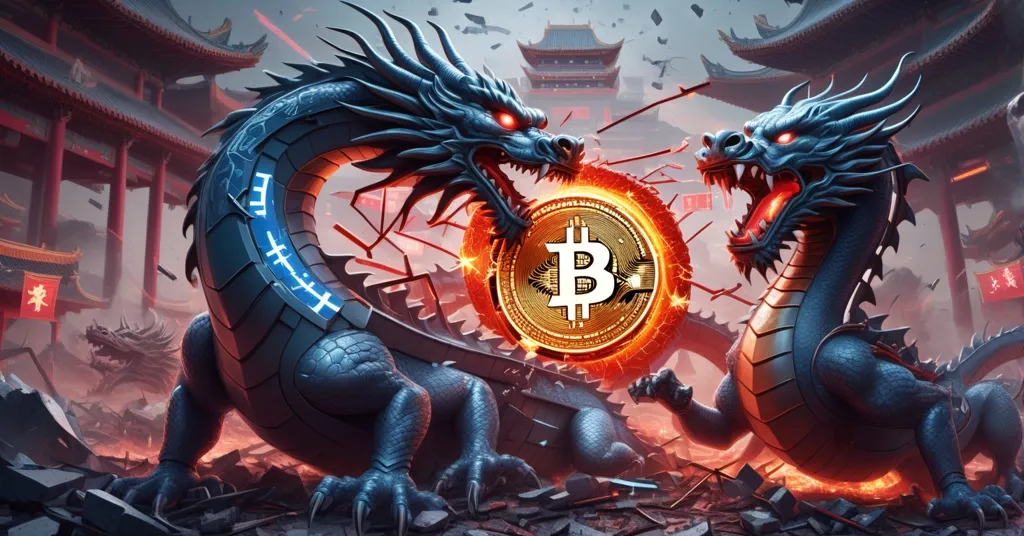China Bans EU Medical Devices: Trade War Heats Up with Crypto Implications

China’s Ban on EU Medical Devices: Trade War Escalates with a Crypto Twist
China has dropped a bombshell in its ongoing economic slugfest with the European Union, banning government procurement of high-value medical devices from EU manufacturers worth over 45 million yuan ($6.3 million). Unveiled on July 6 by China’s Finance Ministry, this move is a biting retaliation to the EU’s recent curbs on Chinese firms in public tenders, and a glaring signal that global trade is fracturing faster than a hacked crypto exchange.
- Retaliatory Strike: China bans EU medical devices valued over 45M yuan in response to EU trade restrictions.
- Component Lockout: Devices with over 50% EU-made parts by contract value are also barred.
- Wider War: This fuels tensions alongside EU tariffs on Chinese EVs and China’s duties on EU brandy.
Dissecting the Ban: A Precision Hit on EU Tech
Let’s slice through the bureaucratic fog. Effective immediately, China’s ban targets government purchases of EU medical devices exceeding 45 million yuan—a hefty blow to an industry generating $70 billion annually for the EU. It gets nastier: the restriction also applies to imports from third countries if over half the contract value comes from EU-made components, tangling global supply chains worse than a Bitcoin transaction backlog during a bull run. The only escape? EU firms producing inside China dodge the ban, a clear push from Beijing for localization. Think giants like Siemens Healthineers or Philips, whose cutting-edge gear—MRI machines with AI diagnostics or robotic surgical tools—often dominates hospital contracts. Losing these deals could bleed millions from their bottom line. Smaller firms? They might not survive without pivoting to new markets or coughing up the cash to set up shop in China. For deeper context on this restriction, check out the detailed report on China’s retaliation against EU medical devices.
For those unfamiliar, government procurement is the process where state entities—like public hospitals—buy bulk equipment through competitive bids, often a goldmine for medical tech exporters. China’s market is massive, and getting locked out is like a miner losing access to the biggest hash pool overnight. It’s not just business; it’s survival.
Roots of the Rumble: Why the Sudden Bad Blood?
This spat didn’t flare up randomly. The EU, tired of playing nice while facing barriers in China’s medical market—think endless red tape and blatant favoritism for local firms—unleashed its International Procurement Instrument (IPI) last month. Simply put, the IPI is a “you scratch my back, I scratch yours” policy from 2022, meant to ensure fair access to government contracts. If China won’t let EU companies bid freely on their turf, Chinese firms get boxed out of EU tenders. It’s a power move, and Beijing didn’t take it lying down. For an expert breakdown of this policy, see this analysis of the IPI and China trade restrictions. The Finance Ministry called it a forced response, while the Commerce Ministry threw punches with this statement:
“Regrettably, despite China’s goodwill and sincerity, the EU has insisted on going its own way, taking restrictive measures and building new protectionist barriers.”
The Finance Ministry echoed the sentiment with equal bite:
“China has no choice but to adopt reciprocal restrictive measures.”
This isn’t just about hospital gadgets. It’s a full-on trade war spilling across sectors. The EU slapped tariffs on Chinese electric vehicles, claiming Beijing’s subsidies distort the market. China fired back with duties up to 34.9% on EU brandy, zeroing in on French cognac—a cultural gut punch. Though big names like Pernod Ricard, LVMH, and Remy Cointreau got mysterious exemptions, the message is clear: China can hit where it hurts. This medical ban is just the latest jab in a brutal economic cage match. For broader context, explore the history of China-EU trade relations.
Collateral Damage: Who’s Bleeding from This Fight?
For EU medical manufacturers, the outlook is grim. Chinese government contracts are often blockbuster deals—think equipping entire hospital networks with imaging tech or surgical kits. Losing that revenue could cripple smaller players who can’t afford to relocate production to China. Larger firms might bite the bullet and localize, but that’s a slow, expensive grind. Some could eye alternative markets like India or Southeast Asia, but those regions lack China’s sheer volume. Take Siemens Healthineers, a heavyweight in diagnostic equipment—China accounts for a chunky slice of their global sales. A ban like this isn’t just a setback; it’s a strategic nightmare. Curious about public reactions? Check out discussions on the impact of China’s ban on EU medical tech.
Flip the coin, and China’s own healthcare system might take a hit. EU tech often represents the bleeding edge—think AI-driven diagnostics or precision robotics. Blocking access could stall hospital upgrades or delay life-saving innovations reaching patients. Is Beijing willing to risk public health to flex geopolitical muscle? Seems so. And let’s not ignore the human toll: EU engineers whose livelihoods hinge on exports, or Chinese hospital admins scrambling for substitutes, are caught in this crossfire. It’s a raw reminder of how quickly state decisions can screw over individuals—much like arbitrary crypto bans leave traders stranded.
Through a Crypto Lens: Decentralization’s Shadow in Trade Wars
Here’s where it gets spicy for us blockchain heads. These trade wars echo the decentralization ethos that fuels Bitcoin and crypto at large. Just as Bitcoin seeks to strip power from centralized banks and overreaching governments, China and the EU are chasing what they call “strategic autonomy”—a fancy term for “we don’t need your damn tech or markets.” China’s “Made in China 2025” initiative pushes for homegrown dominance in key industries, while the EU uses tools like the IPI to shield its own. Sounds like a decentralized dream, right? Not so fast. Unlike Bitcoin, which empowers individuals through peer-to-peer networks, these moves hoard control at the state level. It’s decentralization for governments, not people—a far cry from Satoshi’s vision. For a deeper dive into this dynamic, read this analysis of Bitcoin’s role in trade wars.
Could blockchain tech offer a workaround? Hell yeah, maybe. Transparent supply chain tracking via platforms like Ethereum smart contracts could cut through trade ban bullshit by proving component origins without relying on shady middlemen. Imagine a world where a hospital in China verifies an EU-made device’s parts instantly on-chain, sidestepping political barriers. Bitcoin itself could act as a hedge for firms or individuals battered by currency swings from tariffs and trade spats—fiat gets wobbly, but BTC doesn’t care about borders. That said, Bitcoin maximalists among us would argue only BTC’s unmatched security and neutrality make it a true safe haven, while altcoins like ETH play a vital niche with programmable solutions. Still, let’s not get starry-eyed—governments can strangle crypto innovation just as easily as they ban ventilators. Look at China’s 2021 mining crackdown for proof.
Devil’s Advocate: Are Trade Wars a Crypto Boon or Bust?
Let’s play contrarian for a hot second. Could this economic mess actually turbocharge crypto adoption? As trust in fiat systems frays—imagine currency volatility from endless tariffs or market lockouts—Bitcoin’s borderless, censorship-resistant allure shines brighter. Businesses caught in the China-EU crosshairs might pivot to decentralized finance (DeFi) to dodge trade barriers, much like Venezuelans leaned on BTC during hyperinflation. But here’s the cold, hard reality check: governments aren’t clueless. If they can slam a ban on medical tech overnight, they can just as ruthlessly target crypto exchanges, wallets, or mining ops. Freedom sounds grand until a bureaucrat pulls the plug. And don’t even get me started on scammers—expect grifters to exploit this chaos with fake “trade war hedge” tokens or pump-and-dump schemes. We’ve got zero patience for that garbage at “Let’s Talk, Bitcoin.” Call it out, crush it, move on. For insights on economic impacts, see this discussion on trade wars and medical tech.
Another angle worth chewing on: unlike crypto’s push to empower the little guy, trade protectionism often centralizes power further. China and the EU aren’t breaking free from systems to liberate citizens—they’re building taller walls to control them. Compare that to Bitcoin’s mission of cutting out middlemen like banks or overbearing regulators. The irony stings, doesn’t it? We champion disruption, but state-driven “autonomy” might just choke innovation faster than it fosters it.
Looking Ahead: Summits, Standoffs, and Satoshi’s Ghost
An EU-China leaders’ summit is set for late July, with a laundry list of topics like economic ties, climate goals, and global security. But let’s not kid ourselves—trade beefs like this ban will likely hog the spotlight. China’s timing feels like a deliberate power play, a way to rattle the EU before the bigwigs huddle. Will it pressure Brussels into easing up on EV tariffs or procurement rules? Doubtful, especially since the EU delegation in Beijing has stayed eerily quiet so far. Could be they’re playing chess, waiting to drop a counter-move, or just scrambling for a unified stance. Stay updated with the latest developments on China’s restrictions.
For us in the crypto crowd, this mess hammers home a brutal truth: even as Bitcoin and blockchain pitch a world without borders, old-school geopolitics still calls the shots. Think digital assets are a safe haven from this nonsense? Wait until trade wars bleed into digital currency regs—China’s digital yuan or EU-backed CBDCs could become weapons in this fight, centralizing control under the guise of “sovereignty.” Bitcoin’s promise of freedom glows against this backdrop, but only if we keep governments from strangling it with red tape. Altcoins like Ethereum might carve out roles with tech like decentralized trade platforms, but the maximalist in me says BTC’s the only rock-solid bet when shit hits the fan. Stay vigilant, folks—disruption’s a battle, whether it’s over medical gear or mined blocks.
Key Questions and Takeaways on Trade Wars and Crypto
- What triggered China’s ban on EU medical devices?
China retaliated after the EU’s International Procurement Instrument restricted Chinese firms from EU public contracts, pointing to unfair access to China’s market as the root cause. - How does this amplify the China-EU trade conflict?
It’s another escalation in a string of blows, including EU tariffs on Chinese electric vehicles and China’s duties on EU brandy, marking a deeper fracture in economic relations. - What’s the hit to EU medical manufacturers?
They’re losing massive Chinese government contracts, forcing tough calls—localize production in China at huge cost or chase smaller markets like India with less payoff. - Could China’s healthcare system suffer?
Absolutely. Barring EU tech like advanced surgical robotics might delay critical hospital upgrades, risking patient care for political posturing. - How do trade wars tie into Bitcoin and decentralization?
They reflect crypto’s core fight against centralized control, as both China and the EU push for economic independence—but through state dominance, not individual freedom like Bitcoin offers. - Can blockchain or crypto ease trade war fallout?
Possibly. Blockchain could secure supply chains with transparent tracking on platforms like Ethereum, while Bitcoin hedges against fiat chaos. Yet, government crackdowns remain a looming threat. - Will the EU-China summit cool things down?
Unlikely to fully defuse tensions. Trade spats will overshadow other agendas, and China’s ban may be leverage to push the EU, though a cohesive European response is still unclear.



